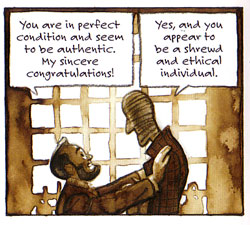It turns out that short Nature Neuroscience paper discussed before, “Neurocognitive correlates of liberalism and conservatism”, is available free (PDF). In case you were curious.
Here’s another find from my time in Switzerland, this time the Zürich Airport.

Approximate translation: “Pirating and counterfeiting is a bad sport: no rules, many fouls, only losers.”
This may actually sound better in English. Does “loser” have that extra connotation in German as it does in English? I didn’t think it did.
In any case, is an airport such a helpful place to put this, especially right near the business lounge in a relatively secluded area? Is any place a helpful place to put this? (I know there is a huge literature on the effectiveness of ad campaigns in various areas. I don’t know if there is any in this particular one.)
I saw this ad somewhere else, too, but I forget where. Have you seen ads of this sort elsewhere?
Since it’s highly unlikely that Scott is going to link to his fascinating _IHE_ column on the work and life of Laud Humphries, writer of a famous study of anonymous sex in men’s rooms, _Tearoom Trade_, I’m going to do it myself. It ain’t just Larry Craig either – the ethical issues surrounding Humphries’ research are pretty interesting:
The book was also widely discussed because of the ethical questions raised by Humphreys’s methodology. It would be an overstatement to call Tearoom Trade the main catalyst for the creation of institutional review boards, but debates over the book certainly played their part.
At issue was not the sexual activity itself but how the sociologist (then a graduate student) investigated it. Posing as a voyeur, and never revealing that he was there for research, Humphreys was accepted as “watchqueen” by the social circle hanging out at the restroom. He was entrusted with giving a signal if the police came around. He took notes on the activity taking place – including the license plates numbers of men who came around for fellatio. Through a contact in the police department, he was able to get their home addresses.
After a year, and having disguised himself to some degree, he visited them under the pretense of doing a survey for an insurance company to gather more data about their circumstances and opinions. Humphreys states that he was never recognized during these interviews. He kept all the documents generated during this research in a lockbox and destroyed them after his dissertation was accepted by Washington University in St. Louis.
This reminds me of Kieran’s “post”:https://crookedtimber.org/2006/05/11/wanting-to-know-everything/ from a while back about the little megalomaniac living inside every academic researcher (and every NSA bureaucrat). Anyway, plenty more “here”:http://www.insidehighered.com/views/2007/09/12/mclemee.
Via “Matt Yglesias”:http://matthewyglesias.theatlantic.com/archives/2007/09/cito.php I see that John Edwards is proposing the creation of “a new treaty organization”:http://johnedwards.com/news/speeches/a-new-strategy-against-terrorism/ to combat terrorism through cooperation on policing and intelligence.
The centerpiece of this policy will be a new multilateral organization called the Counterterrorism and Intelligence Treaty Organization (CITO).
Every nation has an interest in shutting down terrorism. CITO will create connections between a wide range of nations on terrorism and intelligence, including countries on all continents, including Asia, Africa, Latin America, and Europe. New connections between previously separate nations will be forged, creating new possibilities.
CITO will allow members to voluntarily share financial, police, customs and immigration intelligence. Together, nations will be able to track the way terrorists travel, communicate, recruit, train, and finance their operations. And they will be able to take action, through international teams of intelligence and national security professionals who will launch targeted missions to root out and shut down terrorist cells.
The new organization will also create a historic new coalition. Those nations who join will, by working together, show the world the power of cooperation. Those nations who join will also be required to commit to tough criteria about the steps they will take to root out extremists, particularly those who cross borders. Those nations who refuse to join will be called out before the world.
I went and downloaded that Nature Neuroscience [subscribers only – sorry] paper that’s been written up and linked around: “Neurocognitive correlates of liberalism and conservatism”. [click to continue…]

To be found running alongside notorious “unhinged”:http://www.nybooks.com/articles/20590 “liar”:https://crookedtimber.org/2005/08/12/trahisons-des-clercs/ (and senior Giuliani adviser) Norman Podhoretz’s article in the _Wall Street Journal_ on how we’re now fighting WWIV (via “p. o’neill”:http://bestofbothworlds.blogspot.com/2007/09/if-youre-against-iraq-war-this-is-what.html). Pay particular attention to the fifth columnist with the sub-machine gun assault rifle in the shadows – I didn’t notice him first time I looked at the cartoon myself.
Update: the accompanying piece is now up and it’s “dirty hippies a-go-go”:http://www.opinionjournal.com/extra/?id=110010589.
even I never imagined that the new antiwar movement would so rapidly arrive at the stage of virulence it had taken years for its ancestors of the Vietnam era to reach. Nor did I anticipate how closely the antiwar playbook of that era would be followed and how successfully it would be applied to Iraq, even though the two wars had nothing whatever in common. To be sure, this time, mainly because there was no draft, there would be no student protesters and no massive street demonstrations. Instead, virtual demonstrations would be mounted in cyberspace by the so-called netroots and these, more suited to the nature of the new technological age, would prove an all-too-effective substitute.
I’ve just realised that as well as the new academic year for PhD programs, it’s also graduate intake season in the world of proper jobs, and thus a new generation of CT readers will be entering the workforce. And thus, my “Advice to a Young Person”. I only actually have one tip.
Basically it’s this. If you are a young man or woman of fair-to-middling ability, or even a borderline dullard, but you want to get a reputation as an uncommonly bright and perspicacious thinker, it’s really not that hard to do. The secret weapon is this: take an interest in what happens in other countries.
It’s really quite unusual to find an important issue on which international comparisons aren’t worth knowing about. Even in situations which look purely domestic, you can often get an entirely new perspective on things by looking at your fundamental assumptions in the light of what happens overseas. There are few sights sweeter than the look on someone’s face after they’ve confidently proclaimed something to be impossible, only to be informed that they’ve been doing things that way in Australia for the last twenty years.
It’s also a great way to generate ideas; it’s both easier than coming up with something yourself, and more likely to succeed, to plagiarise something that’s already worked well in a different time zone. So few people bother to keep up with the international news that one doesn’t even need to be an expert in these things; simply reading the relevant pages of your daily newspaper will probably do, whereas reading the superficially more “relevant” domestic or business pages will usually just tell you a load of crap you know already, and tell it wrong.
So my advice to a young businessperson is to save ten minutes a day by not reading the domestic news, and spend them on reading the international news properly. Within six months of the graduate program you’ll see I’m right, not least because at least once or twice you’ll quite likely be asked to prepared an analysis of international comparisons by a senior executive who got where he is by following my method.
PS: another great tip is never put question marks on your Powerpoint slides, it always looks really weak.
I just caught the last chunk of David Petraeus’s statement. As Kevin Drum predicted the other day, the Chaos Hawkery was strongly to the fore at the end. I haven’t seen a transcript yet, but the bottom line — after a Westmoreland-like catalog of investment projects and advisory teams — was, “This is a hard road, I can’t assure success, but if we leave I guarantee failure, regional chaos and the rise of Iran and other neighbors. Also, there’s no end in sight.” All of this was well forseen by Petraeus-watchers, of course. But it’s worth going back to this month four years ago when the logic of this approach, now fully articulated in Petraeus’s statement, was becoming clear.
Fred Thompson provided a couple of hours worth of legal advice to the people who blew up were charged with the Pan-Am 103 bombing. Bear in mind that it’s OK if you are Republican, for any value of “it.”
What’s annoying, though, is the way something quite trivial like this — a mere curlicue on the ear of a minor gargoyle on a single buttress of the immense gothic Cathedral of WTF Has Happened Since 2001 — could have the potential to bother a Presidential campaign, whereas the ongoing renovations to said Cathedral are more or less settled doctrine, dirty fucking hippies excepted.
I just finished The Professor’s Daughter [amazon], by Sfar and Guibert. My favorite panel:
Imhotep IV takes refuge in the shop of an antiquarian, before resuming pursuit of his beloved – Lillian, daughter of renowned Egyptologist, Professor Bowell, who is owner of Imhotep IV. As the defense attorney sincerely declaims, a few pages on: “It was love that caused Pharaoh Imhotep IV to cross the centuries and attempt to breach the west wall of the central police station, and it was hastiness that caused Miss Bowell to confuse arsenic and chamomile.” Further complications ensue upon arrival of Imhotep III, who kidnaps Queen Victoria. Love conquers all, the watercolors are lovely.
You can read the first dozen pages at First Second books – purveyors of fine comic product all-around. (But Amazon will give you a better price. But maybe it’s better to buy from the publishers.)
In other art news, I just noticed that Hirst sold the skull:
Damien Hirst’s diamond-encrusted cast of a human skull has been bought by a group of anonymous investors for its asking price of £50 million, the artist’s representatives claimed yesterday.
It is, by a huge margin, the most paid for a work by a living artist.
Entitled For the Love of God, the skull was first displayed at the White Cube Gallery in Mayfair, Central London, in June where thousands queued for a two-minute viewing in a high-security darkened chamber.
Studded with more than 8,500 ethically sourced diamonds, it has been variously described as “an anthropomorphised disco ball”, “the first 21st-century work of art”, “a cosmic wonder”, “the vulgar embodiment of modern materialism” and, by Hirst himself, as “quite bling”.
And Texas can’t decide whether the grammar/penmanship is wrong enough for it to be $550,000 worth of right.
A fine piece by Michael McPherson and Morton Schapiro in the Chronicle of Higher Education (registration and possibly subscription needed). They start by pointing out that for the most part college officials treat ‘values’ as pieties to be brought out when the parents and dignitaries visit, and not very seriously dealt with the rest of the time; and then demonstrate the moral dimension to a a range of management and leadership issues: enrollment management, early admissions, student aid, college rankings, and admissions decisions. It’s an agenda setting piece, not a series of answers. I’d like to see philosophers giving more detailed thought to these issues (so, I know, would McPherson and Schapiro); I hereby encourage bright philosophy PhD students out there to take their agenda and base a dissertation on it. (You might want to look at Levelling the Playing Field before you start). To give a flavour, here’s what M&S say about early admissions:
Early admissions. Last year both Harvard and Princeton Universities made high-profile announcements that they would no longer admit students early. What are the arguments against early decision? You can’t expect a needy student to commit to attend a college or university before knowing the price. Asking a student to decide where to attend college by early November, the typical deadline for early application, increases the frenzy accompanying selective admission. Students admitted in December of their senior year may take the rest of that year less seriously than one might hope. And, given that economists calculate a sizable admissions advantage to applying early, certain students are able to game the system.
After the first weekend’s matches, I’d say that the Southern Hemisphere big-guns haven’t been tested yet (though South Africa had a hard 40 minutes of fighting against the Samoans), and of the IONA countries, only Scotland have any reason to be happy. England were boring and stuck. Ireland looked uncoordinated. Namibia scored two tries against them in four minutes, which is ridiculous. Having beaten France and seen Ireland’s performance today, Argentina must be feeling pretty good right now — and the French are probably feeling better as well.
Thinking about getting a Ph.D? Try lying down until the feeling goes away. Didn’t work? Try (1) Tim Burke on how to tell whether you really want a Ph.D. (Short answer: probably not.) If you persist anyway and find yourself starting a program somewhere at the moment, then (2) Total Drek provides 22 Unhelpful Hints about making the best of it. They’re very good. And so are (3) My co-blogger Fabio Rojas’s Grad Skool Rulz.
Christopher Caldwell is a columnist whom I usually find quite annoying, but his “attack today”:http://www.ft.com/cms/s/0/7fe5cc9a-5d75-11dc-8d22-0000779fd2ac.html (unfortunately behind the paywall) on Bill Clinton’s forthcoming book on charitable giving gets to the crux of the issue. [click to continue…]

